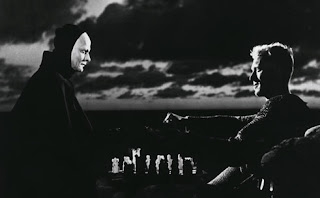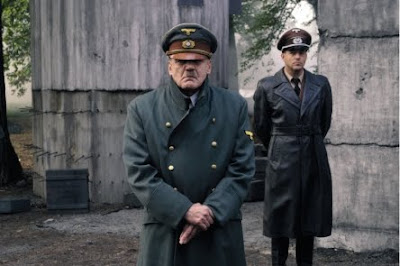The cinema of old took a front and center presence in this past week’s viewing schedule. Three of the four movies I saw over the previous seven days originate pre-1960, while two of them were made by famed Swedish director Ingmar Bergman. Other common bonds: each deals with behaviors and feelings more than stories, and each seems to look into itself from a cracked mirror. Insanity, jealousy, mortality and desperation are deep-seeded ideas in all of these as well. Were they intentionally chosen as such? Not in the least. It was a coincidental parallel. Perhaps this implies that the golden era of both Hollywood and European cinema preferred to deal with reflective impulses, qualities that might seem rare in today’s industry.
Friday, March 26, 2010
Wednesday, March 24, 2010
2012 - ** (2009)
Three things promptly come to mind when watching Roland Emmerich’s latest disaster blockbuster: 1) theories behind 2012 being the year of a potential planetary cataclysm strike me as flimsy and desperate attempts to further promote fear-mongering in an already fearful society plagued by ongoing human tragedies; 2) special effects have indeed come so far and reach so extensively that, in the case of a moviemaker with a lot to prove, it can easily just be a crutch; and 3) no one has obviously been brave enough to tell this movie’s director, a obvious destruction enthusiast, that just because you decide to blow up every known corner of your planet for lavish production purposes doesn’t give you the option to neglect any of the ordinary things that most competent filmmakers utilize. His is a movie that plays more like a preview reel than its own actual end result. It is all about elaborate show rather than a substantive purpose. And the sad thing is that he probably already knows that, and just doesn’t mind.
Tuesday, March 23, 2010
I Hope They Serve Beer in Hell - 1/2* (2009)
The beer-guzzling imbecile that hogs the spotlight of “I Hope They Serve Beer in Hell” is the most unpleasant 20-year old I have seen in a comedy in recent years, soulless and disparaging and so excessive in those qualities that they seem to have no beginning or ending point. A more skilled comedy would have been obligated to reduce him to background distraction after two minutes; unfortunately, based on new traditions, he is allowed to infect celluloid for the full running time and drives the story into rather dubious territory. Often we find ourselves sitting back in total speechlessness, particularly when he degrades women, speaks in vulgar and pompous analogies, indulges in irresponsible behavior, and allows himself to not be bothered by noticing any of the discomfort that he brings to the lives of his own close friends. That he achieves all of this with either a smirk or a chuckle in conjunction with a crude line of dialogue is a convenient narrative cop-out, one meant to imply that the mean-spiritedness of the material is really just tongue-in-cheek. Too bad it isn’t in the least bit funny.
Saturday, March 20, 2010
Poltergeist - ***1/2 (1982)
The ghost story was a fairly straightforward endeavor shackled by underlying menace in Hollywood’s golden days, but “Poltergeist” was perhaps one of the first movies to sensationalize it, to turn the idea in on itself and expose its more elaborate potential. Before it, few even knew the difference between poltergeists and hauntings, or if there was even a purpose to differentiate them; in a day when the cinema was about the growing presence of slasher films, the idea of a horror movie dealing in any part with the afterlife was superfluous. To our benefit, Steven Spielberg saw differently, and a crucial ingredient in achieving that realization may have come from his choice of Tobe Hopper as the director, whose own experience making “The Texas Chainsaw Massacre” gave him perhaps the right tools as a showman to cause the stage surrounding this straightforward premise to erupt with lavish fanfare. And yet the movie is more than just a story of strange ghostly phenomenon that is upstaged by special effects or grandiose plot twists; it portrays the material realistically, uses both mind and heart in the delivery, and is played by actors who seem to have a more genuine stake in the outcome than studio execs eager to plan sequels.
Friday, March 19, 2010
THE VIEWING LIST (03/19/10)
Thursday, March 18, 2010
Aguirre, The Wrath of God - **** (1972)
Werner Herzog’s “Aguirre: The Wrath of God” begins and ends with like-minded shots – the first being that of a troupe of explorers scaling down a soaring cliff side in the Andes Mountains, and the last being that of a raft tugging steadily down a river as its inhabitants are picked off one by one from sailing arrows in the distance. Both moments are a symbol of a greater puzzle destined to unfold in brooding and hypnotic passages, yet isolated they underline a greater implication, an idea that allows viewers to observe and react on the basis of behavior and subtlety above any semblance of movie structure. This is the kind of endeavor that persists in the mind not because it implores the idea of effective payoff, but rather with the thought that payoffs are irrelevant. It seeks something deeper, something more haunting and more thought-provoking than just basic core values; it knows far more about what gets under our skin than it should.
Friday, March 12, 2010
THE VIEWING LIST (03/12/10)
NOTE: “The Viewing List” is a new weekly column that
recaps the films that have been viewed outside of the movie theater over the
course of the prior seven days: films that are being absorbed for the first
time, movies that are being revisited or reassessed, whatever might come the
way of home theater. Additionally, because much was missed over the course of
four years (when this site’s review publishing pattern was sparse at best), the
necessity to backtrack is relevant. This does not suggest that movies featured
in this section are being punished from full-length review treatment, however.
What it is meant to do is serve as a personal and public record of what is
being seen, and hopefully inspire readers to suggest additional material for
viewing as well. The more we learn about cinema, the more we realize how little
we actually know.
Thursday, March 11, 2010
Alice in Wonderland - *** (2010)
Downfall - **** (2002)
Tuesday, March 9, 2010
The times are-a-changin’
The new decade sees a sunrise over a still enigmatic horizon, and sometimes the ones who seek shade are resolved to standing out in the rays of light. For twelve years I was both the writer and the webmaster of Cinemaphile.org, a personal hub of movie-related articles, essays and editorials, and loved every minute of it. But the time also came where things were no longer fun, and passions became chores in an age when new passages were being explored. In a moment of reflection, I realized it was not the writing itself that felt labored, it was implementing the material into repetitive static HTML pages on a web design program I had been using since the early 00s. The evolution of web design meant that things could get easier, but I no longer cared about exploring those avenues. It was the written word I cared about, not the canvas it would be presented on.
Subscribe to:
Posts (Atom)









